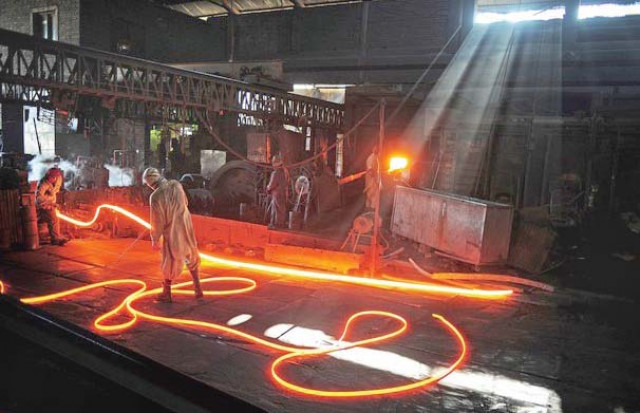Steel industry perturbed by price distortion
Blames flawed planning, lack of regulatory oversight on part of govt

Stakeholders of the iron and steel sector have stated that policymakers and government functionaries are bent on destroying steel units of the private sector.
Speaking at a press conference on Thursday, they said that flawed planning and lack of regulatory oversight caused distortion in the industry.
They also criticised the authorities for their failure to revive Pakistan Steel Mills.
Read: Steel price hike takes toll on economy
“The capacity of Pakistan Steel Mills was just 1.2 million tonnes per annum and still the government failed to run it efficiently,” said Federation of Pakistan Chambers of Commerce and Industry (FPCCI) Vice President Mian Akram Fareed.
“The combined production of Mughal Iron and Steel and Amreli Steels is more than 2 million tonnes and instead of supporting the private sector, officials are creating trouble for investors.”
He was of the view that government’s decision to abolish the federal excise duty on 40 units located in the erstwhile Federally Administered Tribal Areas (Fata) would damage the whole industry.
“Owing to the availability of tax-exempted goods across major markets, the steel industry is suffering losses,” said Pakistan Association of Large Steel Producers Patron-in-Chief Abbas Akberali. He pointed out that his own company operated at full capacity and registered historic high sales during the previous financial year, but still reported a loss of around Rs1.7 billion.
“The loss was borne on account of price distortion,” he said. “When cheap products are available in markets, we are forced to lower prices or opt for complete shutdown.”
Read more: Tax issues can cause urea price hike
Following the elimination of FED on FATA units, the products from that region would become cheaper by up to Rs27,000 per tonne, he said.
Mughal Steel official Javed Mughal said that during the previous fiscal year, around 0.5 million tonnes of duty-free scrap was imported for the Fata units, however, their electricity bills reflected that only 100,000 tonnes of steel products were produced.
“The question is where did the rest of the scrap go and more importantly, how much iron and steel products were consumed in the Fata region,” he asked. He pointed out that a culture of tax fraud was being promoted in that region.
Published in The Express Tribune, June 18h, 2021.
Like Business on Facebook, follow @TribuneBiz on Twitter to stay informed and join in the conversation.



















COMMENTS
Comments are moderated and generally will be posted if they are on-topic and not abusive.
For more information, please see our Comments FAQ